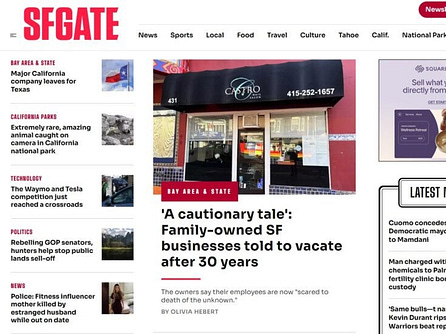|
How SFGATE is making US local news pay | Profit and revenue boost for Ladbible
And US judge strikes blow against copyright as court rules Anthropic was OK to use books without permission to train AI model
Welcome to your daily Press Gazette media briefing on Wednesday, 25 June, brought to you in association with Opinary – the audience engagement platform behind polls in The Times, FT, and Daily Mail etc.
AI-induced angst and macroeconomic turmoil are currently combining to give many news publishers the collywobbles.
But two contrasting success stories on Press Gazette today provide evidence that there is still profit and growth to be found om the world of ad-funded online journalism.
They reveal revenue and profit up in the first six months of its financial year to the end of March with 17 brands spending more than $1m per year. It is also making good money from revenue shares with social media platforms.
CEO Solly Solomou said: "The value of human-created content is not in doubt and will rise significantly in this next chapter for content. This is mutually compatible with the increasing use of AI-generated material."
Meanwhile we report on a local news success story from the United States, SFGATE. The site began in San Francisco and now has a 61-strong team providing coverage across California's tourism hotspots. It is also ad-funded and editor-in-chief Grant Marek was similarly bullish about the impact of AI.
He said: "AI Overviews is absolutely killing sites that were gaming the system trying to answer reader queries. We’re just not playing that game.
“We rarely do lists or write content that is trying to answer a Google question. Sites that put a lot of weight into that are hurting tremendously."
Press Gazette Future of Media Awards: DEADLINE EXTENDED
You now have one more day to get your entries in and stand a chance to share a taste of glory at the event which celebrates great digital journalism products and strategies.
From our sponsor
How Yahoo UK builds community and return readership with a weekly poll
Yahoo UK’s “Poll of the Week” has become a regular feature for their audience—inviting readers to weigh in on the week’s most talked-about stories, from politics and public services to lifestyle and entertainment.
As the latest Reuters Digital News Report highlights, younger audiences increasingly avoid traditional news formats and lean into experiences that feel participatory, relevant, and informal. Yahoo’s polls fit that shift: fast, inclusive, and built to reflect the audience back to itself.
Senior Editor Alexander Kay shares how the format came to life, what makes it work, and how other newsrooms can use their learnings to turn passive readers into active participants.
On Press Gazette
How SFGATE is making local news pay and filling California’s news gaps
“We’re not assigning breaking stories to a generalist in San Francisco who’s never been to Tahoe,” Marek says. “We’re hiring someone who lives there and knows what matters to that community.”



